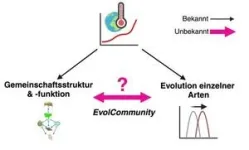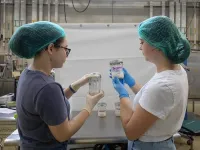(Press-News.org) UNIVERSITY PARK, Pa. — Sniffles, snorts and blows of runny noses are the hallmarks of cold and flu season — and that increase in mucus is exactly what bacteria use to mount a coordinated attack on the immune system, according to a new study from researchers at Penn State. The team found that the thicker the mucus, the better the bacteria are able to swarm. The findings could have implications for treatments that reduce the ability of bacteria to spread.
The study, recently published in the journal PNAS Nexus, demonstrates how bacteria use mucus to enhance their ability to self-organize and possibly drive infection. The experiments, performed using synthetic pig stomach mucus, natural cow cervical mucus and a water-soluble polymer compound called polyvidone, revealed that bacteria coordinate movement better in thick mucus than in watery substances.
The findings provide insight into how bacteria colonize mucus and mucosal surfaces, researchers said. The findings also show how mucus enhances bacterial collective motion, or swarming, which may increase antibiotic resistance of bacterial colonies.
“To the best of our knowledge, our study is the first demonstration of bacteria collectively swimming in mucus,” said Igor Aronson, Huck Chair Professor of Biomedical Engineering, of Chemistry and of Mathematics at Penn State and corresponding author on the paper. “We have shown that mucus, unlike liquids of similar consistency, enhances the collective behavior.”
Mucus is essential for many biological functions, explained Aronson. It lines the surfaces of cells and tissues and protects against pathogens such as bacteria, fungi and viruses. But it is also the host material for bacteria-born infections, including sexually transmitted and gastric diseases. A better understanding of how bacteria swarm in mucus could pave the way for new strategies to combat infections and the growing problem of antibiotic resistance, according to Aronson.
“Our findings demonstrate how mucus consistency affects random motion of individual bacteria and influences their transition to coordinated, collective motion of large bacterial groups,” Aronson said. “There are studies demonstrating that collective motion or swarming of bacteria enhances the ability of bacterial colonies to fend off the effect of antibiotics. The onset of collective behavior studied in our work is directly related to swarming.”
Mucus is a notoriously challenging substance to study because it exhibits both liquid-like and solid-like properties, Aronson explained. Liquids are typically described by their level of viscosity, how thick or thin the liquid is, and solids are described by their elasticity, how much force it can take before breaking. Mucus, a viscoelastic fluid, behaves as both a liquid and solid.
To better understand how mucus becomes infected, the team used microscopic imaging techniques to observe the collective motion of the concentrated bacteria Bacillus subtilis in synthetic pig stomach mucus and natural cow cervical mucus. They compared those results with observations of Bacillus subtilis moving in a water-soluble polymer polyvidone at a wide range of concentrations, from high to low levels of polyvidone. The researchers also compared their experimental results to a computational model for bacterial collective motion in viscoelastic fluids like mucus.
The team found that the consistency of mucus profoundly affects the collective behavior of bacteria. The results indicated that the thicker the mucus, the more likely the bacteria would exhibit collective movement, forming a coordinated swarm.
“We were able to show how the viscoelasticity in mucus enhances bacterial organization, which in turn leads to coherently moving bacterial groups that cause infection,” Aronson said. “Our results reveal that the levels of elasticity and viscosity in mucus are a main driver in how bacterial communities organize themselves, which can provide insight into how we can control and prevent bacterial invasion in mucus.”
Aronson explained that the team expects human mucus to exhibit similar physical properties, meaning their findings are also relevant for human health.
“The onset of the collective motion of bacteria and their interaction with mucus should be the same as in cow, pig or human mucus since these substances have similar mechanical properties,” Aronson said. “Our results have implications for human and animal health. We’re showing that mucus viscoelasticity can enhance large-scale collective motion of bacteria, which may accelerate how quickly bacteria penetrate mucus protective barrier and infect internal tissues.”
The other co-author on the paper is Wentian Liao, a doctoral candidate in biomedical engineering at Penn State. The National Science Foundation supported the work.
END
Bacteria's mucus maneuvers: Study reveals how snot facilitates infection
New study shows thicker mucus supercharges bacteria’s ability to self-organize into swarms to spread infection
2023-12-05
ELSE PRESS RELEASES FROM THIS DATE:
Shuqing Xu receives ERC Consolidator Grant for his research on the evolution in ecological communities in response to climate change
2023-12-05
Eating or being eaten, competing for resources – these are certainly the best-known interactions among organisms coexisting in an ecosystem, but they are by no means the only ones. In fact, different species live together and interact in complex ways. But how do different species evolve or coevolve in a community as temperatures rise due to climate change? Current research focuses primarily on how individual species react to climate change. However, as species interact with each other in the ecosystem, the evolutionary responses to climate change are difficult to predict from studying each species in isolation. For example, a plant may grow faster due ...
Study of sourdough starter microbiomes to boost bread quality and safety
2023-12-05
UNIVERSITY PARK, Pa. — People with celiac disease, or intolerance to dietary gluten, may soon have more food options, thanks to an unlikely source: sourdough bread. Sourdough contains less gluten than other breads, making it more tolerable for people with gluten sensitivities. Now, Penn State and Colorado State University researchers are studying whether bacteria in the yeast starter needed to make sourdough bread might help reduce gluten in other bread products.
Gluten is a protein naturally found in cereal grains such as wheat, barley and rye that can trigger an ...
UT receives National Institute of Justice awards for forensics research
2023-12-05
The Forensic Anthropology Center at the University of Tennessee, Knoxville, has received two grants totaling over $580,000 from the Office of Justice Program’s National Institute of Justice, the research, development and evaluation agency of the U.S. Department of Justice. A longtime grantee across numerous forensics research topics, the center – which includes the Anthropological Research Facility, also known as the Body Farm – is known worldwide for its research and training.
The first of the two new research projects will help law enforcement locate clandestine graves, and the second will help inform how relic DNA in the soil affects forensic ...
Newly identified biomarkers may detect early cognitive decline via blood test
2023-12-05
UNIVERSITY PARK, Pa. — For some people, extreme stressors like psychiatric disorders or childhood neglect and abuse can lead to a range of health problems later in life, including depression, anxiety and cardiovascular disease. A new study led by researchers in the Penn State Center for Healthy Aging identified genetic indicators that can predict another health problem, the decline of cognitive abilities, among people who have been affected by these extreme stressors.
The team recently published their findings ...
Researchers predict climate change-driven reduction in beneficial plant microbes
2023-12-05
UNIVERSITY PARK, Pa. — Bacteria that benefit plants are thought to be a critical contributor to crops and other ecosystems, but climate change may reduce their numbers, according to a new study by an international team of researchers. They published their findings in Nature Food.
The collaboration, including Francisco Dini-Andreote, professor of plant science at Penn State, characterized the abundances and distributions of plant beneficial bacteria (PBB) from soils collected across the globe. The researchers ...
Addicted to your phone? New tool identifies overuse of digital media
2023-12-05
BINGHAMTON, N.Y. -- The rapidly evolving nature of digital media presents a challenge for those who study digital addiction – social networks like TikTok and video games like Fortnite might be popular now, but they could be irrelevant in a matter of years. A new tool developed by researchers from Binghamton University, State University of New York will make it easier for clinicians and researchers to measure digital media addiction as new technologies emerge.
“We wanted to create a tool that was immediately useful in the clinic and lab, that reflects current understandings about how digital addiction works, that wouldn't go obsolete once the next big tech ...
International consensus report on gaps and opportunities for the clinical translation of precision diabetes medicine
2023-12-05
Boston, MA - A new international consensus report on precision medicine in diabetes prevention and care highlights the significant advancements in precision medicine in diabetes prevention, diagnosis, treatment, and prognosis while also shedding light on numerous knowledge gaps.
The report, Second international consensus report on gaps and opportunities for the clinical translation of precision diabetes medicine, was published in Nature Medicine on October 5, 2023.
Supported by the American Diabetes Association (ADA), the European Association for the Study of Diabetes (EASD), and the Novo Nordisk Foundation, the consensus report was made possible through a huge collaborative ...
Depression, constipation, and urinary tract infections may precede MS diagnosis
2023-12-05
EMBARGOED FOR RELEASE UNTIL 4 P.M. ET, TUESDAY, DECEMBER 5, 2023
MINNEAPOLIS – In some diseases, the underlying processes can start years before a diagnosis is made. A new study finds that people who later develop multiple sclerosis (MS) are more likely to have conditions like depression, constipation and urinary tract infections five years before their MS diagnosis than people who do not develop MS. The study, which is published in the December 5, 2023, online issue of Neurology®, the medical journal of the American Academy of Neurology, also found that sexual problems and bladder infections, or cystitis, ...
Chemists create organic molecules in a rainbow of colors
2023-12-05
CAMBRIDGE, MA -- Chains of fused carbon-containing rings have unique optoelectronic properties that make them useful as semiconductors. These chains, known as acenes, can also be tuned to emit different colors of light, which makes them good candidates for use in organic light-emitting diodes.
The color of light emitted by an acene is determined by its length, but as the molecules become longer, they also become less stable, which has hindered their widespread use in light-emitting applications.
MIT chemists have now come up with a way to make these molecules more stable, allowing them to synthesize acenes of varying lengths. Using their new approach, ...
NCCN summit navigates solutions for financial and other cancer-related hardships
2023-12-05
PLYMOUTH MEETING, PA [December 5, 2023] — Today, the National Comprehensive Cancer Network® (NCCN®)—an alliance of leading cancer centers—hosted a Patient Advocacy Summit to explore the role of navigation throughout the cancer process. A diverse group of subject matter experts addressed the impact patient navigation has on care and how to utilize navigators to reduce economic burdens and disparities in care. The speakers included patients and advocates, policymakers, health care providers, and health data analysts.
The summit featured a series of best practice presentations highlighting some of the tools available to assist in various ...
LAST 30 PRESS RELEASES:
Alkali cation effects in electrochemical carbon dioxide reduction
Test platforms for charging wireless cars now fit on a bench
$3 million NIH grant funds national study of Medicare Advantage’s benefit expansion into social supports
Amplified Sciences achieves CAP accreditation for cutting-edge diagnostic lab
Fred Hutch announces 12 recipients of the annual Harold M. Weintraub Graduate Student Award
Native forest litter helps rebuild soil life in post-mining landscapes
Mountain soils in arid regions may emit more greenhouse gas as climate shifts, new study finds
Pairing biochar with other soil amendments could unlock stronger gains in soil health
Why do we get a skip in our step when we’re happy? Thank dopamine
UC Irvine scientists uncover cellular mechanism behind muscle repair
Platform to map living brain noninvasively takes next big step
Stress-testing the Cascadia Subduction Zone reveals variability that could impact how earthquakes spread
We may be underestimating the true carbon cost of northern wildfires
Blood test predicts which bladder cancer patients may safely skip surgery
Kennesaw State's Vijay Anand honored as National Academy of Inventors Senior Member
Recovery from whaling reveals the role of age in Humpback reproduction
Can the canny tick help prevent disease like MS and cancer?
Newcomer children show lower rates of emergency department use for non‑urgent conditions, study finds
Cognitive and neuropsychiatric function in former American football players
From trash to climate tech: rubber gloves find new life as carbon capturers materials
A step towards needed treatments for hantaviruses in new molecular map
Boys are more motivated, while girls are more compassionate?
Study identifies opposing roles for IL6 and IL6R in long-term mortality
AI accurately spots medical disorder from privacy-conscious hand images
Transient Pauli blocking for broadband ultrafast optical switching
Political polarization can spur CO2 emissions, stymie climate action
Researchers develop new strategy for improving inverted perovskite solar cells
Yes! The role of YAP and CTGF as potential therapeutic targets for preventing severe liver disease
Pancreatic cancer may begin hiding from the immune system earlier than we thought
Robotic wing inspired by nature delivers leap in underwater stability
[Press-News.org] Bacteria's mucus maneuvers: Study reveals how snot facilitates infectionNew study shows thicker mucus supercharges bacteria’s ability to self-organize into swarms to spread infection






